Marcus of Bondi
World Champion
Photo: Eugene Tan
Last week my friend Marcus described to me the moment he started to become a champion. Marcus is now fifty six years old, the holder of three Guinness World Records, and he can do a muscle up with the ease with which most of us put a potato chip in our mouths.
Source: Marcus Bondi Instagram
It happened when Marcus was forty one years old. He had just sold his advertising company Schmooze to the largest privately-held public relations company in the world, Edelman Worldwide. He was physically very fit, the father of two beautiful young daughters, and had been happily married to his wife, Emma for almost 20 years. Like my friends and me at the time, he was prosperous, had a young family and a good career, and he was in good shape. Marcus was probably stronger than most of us, but not by much.
Shortly after he completed his one year earn-out following the sale, and was a completely free man with money in the bank, Marcus went to see his doctor for a routine health checkup. As Marcus told me, “she listened to my heart and she said, I'm booking you in for a hospital appointment. You're going straight in for heart surgery. You've got a heart murmur. And we're going to have to have a full evaluation and all the tests.”
Photo 24262314 © Stephanie Berg | Dreamstime.com
Naturally, the news came as a terrible shock. Marcus told me “I was crestfallen. I was devastated. I thought ‘This is it’. I'm a failure. I’ve failed my wife and my kids. I won't be able to live much longer now, and my children are only three and four years old.”
Marcus had to wait seven days to see a heart specialist to have the necessary tests to determine what kind of heart surgery he would require, and whether his life could be saved. In an instant Marcus went from being on top of the world to plunged in regrets: “Those seven days were hell for me. I was thinking, ‘My life!—how would I have done things differently if I only knew I was neglecting my heart? Why don't I have a healthy heart? If only I could do it again! I'd change everything! I'd try harder—work harder!”
Marcus took responsibility for his predicament, sincerely, never from the first moment blaming circumstances or anybody else. His response reveals the mindset of a champion, even though at the time he was not much different from the rest of us. He didn’t treat the shocking news as if it were a random accident or a meaningless event generated by an indifferent universe. Marcus accepted complete responsibility for his heart condition—he only wished he’d have another chance at getting it right.
Marcus had more reasons than most of us to make excuses or blame a random, indifferent universe for his stunning predicament: he had never smoked, he hadn’t drunk alcohol since university days, when he would do a hundred pushups and a hundred pull-ups before going to the pub. He was brought up in a European family with parents who were early practitioners of eating healthfully: “We had no white bread, white flour, white pasta in the house, no sugar, nothing in the freezer, except ice cubes. Only fresh vegetables.” As a boy, Marcus had watched and imitated his father’s rigorous daily routine of pushups, pullups and squats, and during his own career as an advertising executive Marcus would do pushups under his desk.
And yet he’d just been given a death sentence, or at the very least, a remaining life of limited activity. So Marcus spent seven days which he describes as “very deep, traumatic introspection about my life, and what I would do differently, and how it was potentially over.”
It was during this week he experienced the moment that changed his life.
Early one morning, his mind full of thoughts about how his life was likely about to end, Marcus drove to Bondi Beach, near where he lives. He sat in his car in the parking lot looking over the beach, watching surfers, people walking their dogs and jogging on the Promenade, and the people working out on the exercise equipment and pull up bars. Marcus couldn’t do anything except sit in his car because his heart might blow up at any second.
Source: North Bondi Soft Sand Harriers
His eyes fell on a man running in the sand. At Bondi, there’s always a small number of people running in the sand in the morning before the day gets too hot. It’s an excruciatingly slow, grueling, tedious way to exercise. I’ve done it myself and I hate it. Actually, Marcus hated it, too. But as he sat in his car, not knowing how much longer he was going to live, he watched the runner chugging through the sand and Marcus thought, “If I could just be that guy who can just run without worrying about his heart. I'd be running a million miles, every hour, every day. If only I could do that, but I can't do that.”
At last, after seven days Marcus went to see the heart specialist. The heart specialist examined Marcus briefly, put the stethoscope to Marcus’s chest, then he looked up and asked, “What's supposed to be the problem? You've got the healthiest heart I've ever seen in my life.”
It turned out that Marcus’s body fat was so low that when his GP had put the stethoscope to his chest the week before, she’d never heard a heart so loud or so clearly. The extra fat most people carry muffles the sound of their hearts. The heart specialist told Marcus, “You can go home, and just carry on as you’ve been carrying on.” Marcus was completely stunned by his second reversal of fortune within a week, and asked to undergo a complete set of tests to make 100% the specialist was correct–which he turned out to be.
But Marcus had no intention of just carrying on the way he had before. On one hand, Marcus thought to himself, “This is bizarre! What just happened?” But he also knew millions of people are told they’re terminally ill and, in fact, die shortly afterwards. Marcus was determined to hold on to the intense feeling he’d experienced of the preciousness of life. He says, “You have to keep your promise to yourself about what you would have done if you could just have that second chance.”
Marcus thought back to the man he’d seen running in sand, which before Marcus’s misdiagnosis was the least attractive, most repulsive exercise he could have imagined. He realized that now, even after the good news, he would gladly run in the sand all day, every day. The good news filled Marcus with a determination to truly enjoy life, to dedicate himself to the ongoing celebration of precious experiences, and to take health and fitness to the highest possible level. Marcus felt his “second chance” gave him license “to go even harder and faster and stronger and do more. I’m going to ramp it up—I’m going to go a million percent now!”
That's how Marcus began his journey to becoming the Guinness World Record holder in rope climbing. Speed rope climbing is a very difficult thing to do, because you don’t have time to lock the rope with your feet, and must use only your arms to haul your body up the rope, which is itself shifting constantly as you ascend. If you don’t prepare yourself properly, the strain of repeatedly wrenching your body weight suddenly upwards can break your humerus, which is the bone between your elbow and your shoulder. If you don't have the physical strength in your muscles and connective tissue, the stress will break that bone and it happens a lot.
Source: Marcus Bondi Archive.
It just so happens in Bondi there is a group of avid rope climbers. The problem is, they’re an intimidating group of Eastern European men, most of whom are ex-special forces soldiers, and they don’t easily welcome outsiders. A powerful Russian named Dimitri is their acknowledged leader.
So Marcus decided to see if he could get into that rope climbing group, so he made friends with a guy who was half Russian half Australian. And this guy eventually introduced him to Dimitri, who accepted him as a newbie into the group.
Just to give you an idea how hard rope climbing is, Marcus recommends the following regimen before you even try to climb a rope:
20 quick close-grip supinated chin-ups to 95% extension; no kipping, no swinging;
20 Towel Chin-ups: Roll a towel lengthways and fold it in half, then hang the looped end over a bar (or tree branch/stair rail) and feed the two loose ends through the loop and pull it tight. Then grab each end of the towel tight and hard and pull yourself up.
Now it’s time to get on the rope!
(Dmitri is on the right rope, Marcus stands on the rocks)
Copyright: Rex Dupain. Used with permission, all rights reserved.
So at the age of forty one, Marcus began living his second life as the apprentice to the Bondi Eastern European rope climbers, carrying the bag that contained the climbing rope and the chains by which the rope was secured to the top of the cliff. He carried the bag, which weighed about 15 kilos, across the beach and over the jagged, wave-swept rocks of North Bondi, across the sharp barnacles to the location at the cliffs where the climbing rope was set up.
The group met on Wednesdays and Saturdays at 12:30PM, year around. Marcus was responsible for setting up the rope safely, 25 feet high above jagged rocks. There were about twelve men in the group, most of them battle-hardened.
Every session, each man was allowed to make six climbs in a strict order: the guy who did the most climbs the previous week was number one. Then the guy who did the second most climbs the previous week was number two. After the new results were in, the hierarchy would be re-ordered depending on how well each climber had done that session. It was very high pressure and very, very competitive. The fierce competition pushed everyone to new levels of achievement, and as a group the small band of men became more and more proficient at the rope climb.
Once the climb began, there was no safe option for letting go of the rope—at the bottom of the rope were only jagged, slippery rocks. For the first year, after the rope climbing sessions, Marcus would just go lie down on the grass or the sand with aching arms, and the next day his arms would be so sore he wouldn't be able to turn the steering wheel of his car. As the years went by, he was able to go up and down the rope eighteen times in six climbs, and then twenty times in six climbs.
They were so competitive with each other and they were so rigorous, that they pushed each other to totally new levels. And several years later Marcus was just reveling in his second life. As hard as it was, and as tough as these guys were, he was just full of happiness, exuberance.
After about five or six years, Dimitri, who is a well-known local Bondi celebrity, got a phone call from the Guinness Book of World Records. They said, “we're coming to Australia,” and “do you know anyone that you think could break the world record for rope climb?” Dimitri said, “Oh yeah, well, we'll give it a shot.”
So the Bondi rope climbers did trials to see who in the group could climb the best according to the specifications of the Guinness Record.
It was Marcus.
The record holder at the time was a Spanish gymnast who had competed in the 1992 Olympics.
And Marcus smashed the record, climbing 27.2 meters in 60 seconds, compared to the 19 meters in 60 seconds which was the previous record.
Something I've always noticed about Marcus is his positive attitude and the joy with which he lives his life. He's now 56 years old, and he has this zest for life. He is an incredibly positive person. I didn’t know why until last week, but I now look back on the ten years we’ve been friends and I realize Marcus never forgot the moment he watched that guy chugging through the sand. Every moment, Marcus nurtures the gratitude of being alive.
His zest for life comes through in the way Marcus recommends we use our emotions, whether positive or negative, to motivate ourselves to train:
“Train hard—it’s up to you! Never pity yourself. Use your emotions to fortify your workouts. If you are happy, do a superset. Sad? – Superset! Angry? - Superset! If somebody or something annoys you, don’t let it upset you—treasure it – save the feeling and unleash it ASAP on the bar or straight into pushups on the floor right where you’re standing. Smash it out! All your emotions will now be working to your benefit!”
Marcus went on to set two other Guinness World Records: the most chin-ups in sixty seconds while weighted with forty lbs (27), and the heaviest weighted chin up—104 kilos (228 lbs)--a Guiness World record Marcus broke at the Arnold Schwarzenegger Classic. Schwarzenegger was there watching Marcus, and when Marcus broke the record Arnold walked up with his entourage and said, with his heavy Austrian accent, “I vish I could do what you do–that was amazing.” Marcus, gracious as always, said “Arnold, you’ve inspired a generation! You’re Number One,” and Arnold replied, “No Marcus–you’re Number One.”
I’ve met Schwarzenegger before, and he’s a straight shooter with a wicked sense of humour—I have no doubt he sincerely meant what he said to Marcus.
Marcus was 51 years old when he set these records.
To me, the most amazing thing about Marcus’s physical prowess is his ability to do muscle ups. Most men are unable to do a single pull up. Even strong men struggle to do half a dozen proper pull-ups with their chins over the bar. Marcus does muscle ups with astonishing ease and grace. Marcus does muscle ups far more easily than even a strong man does pull ups. Marcus’s joie de vivre has motivated him to arrive to a completely different level than most of us. Marcus believes we can all transcend ourselves by training hard and consistently.
Since that morning he watched the guy laboriously making his way across the sand at Bondi as he sat in the car, Marcus hasn’t been running from death. He became a champion by filling himself with gratitude and the joy of being alive.
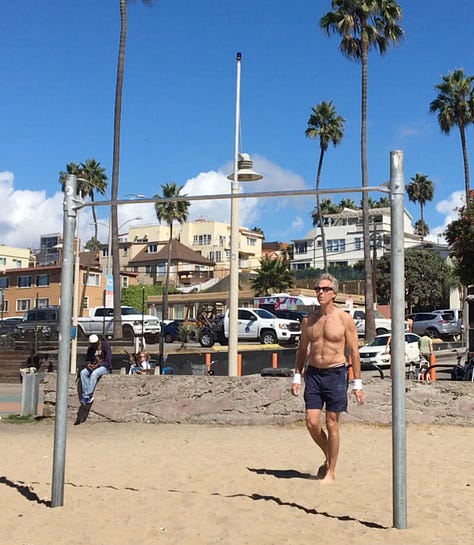
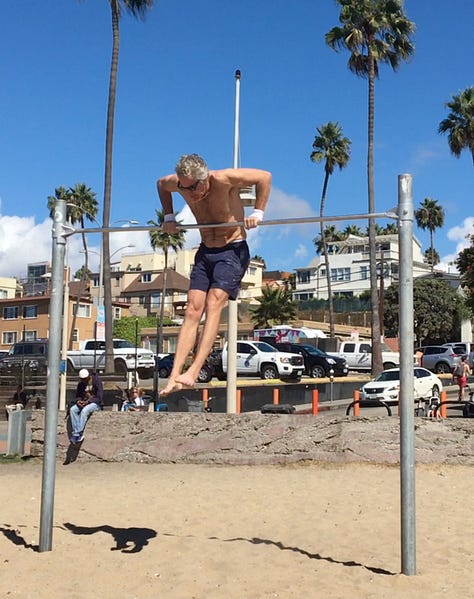
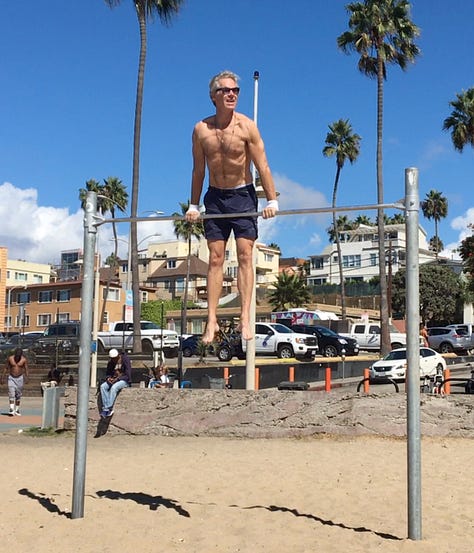
He’s a model for all of us.
Links
Santa Monica Beach Gym Rope Climb Record:
Instagram Muscle Up:
https://www.instagram.com/reel/CfqxQh3lWCB/?igshid=MDJmNzVkMjY=


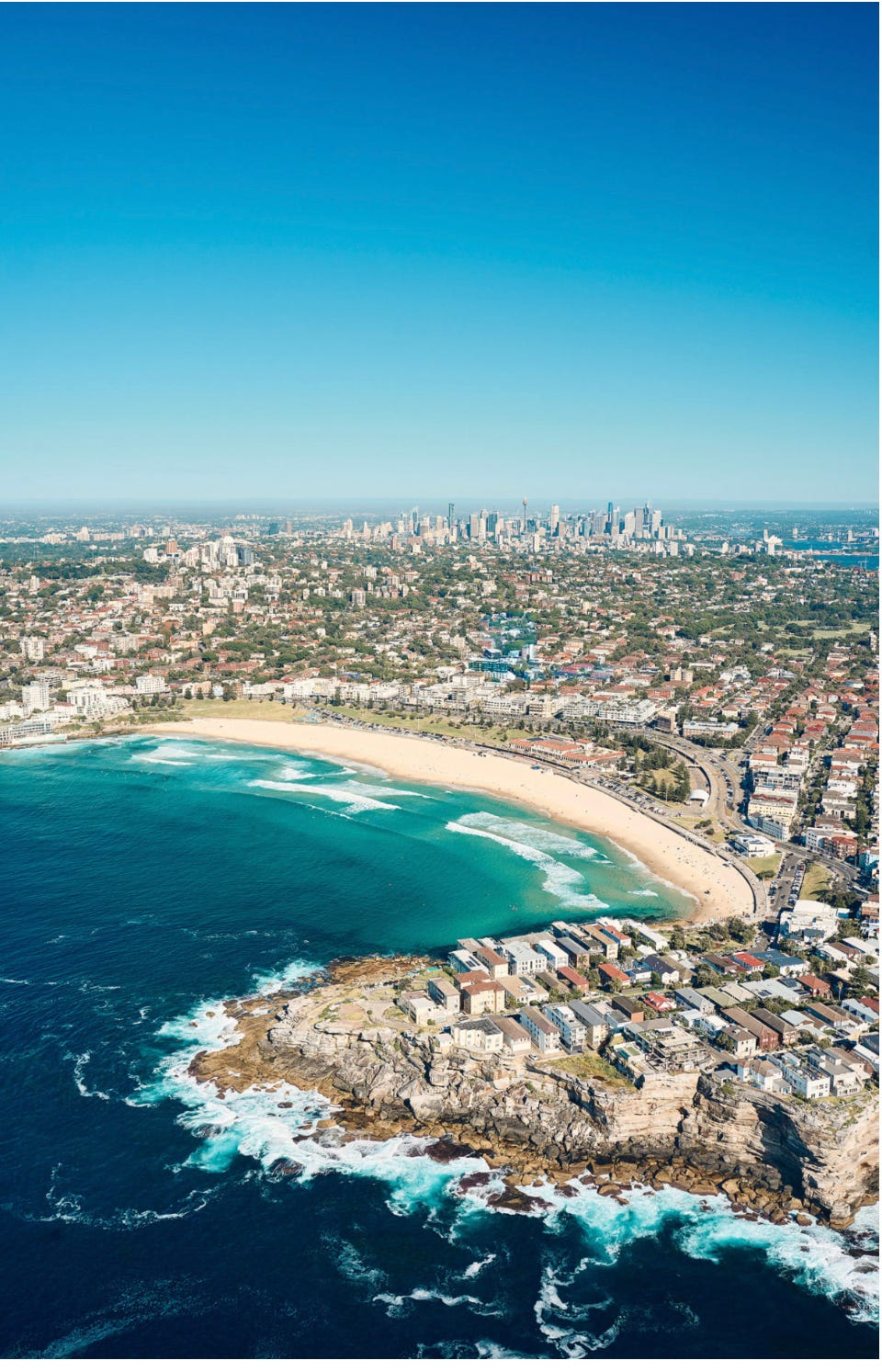
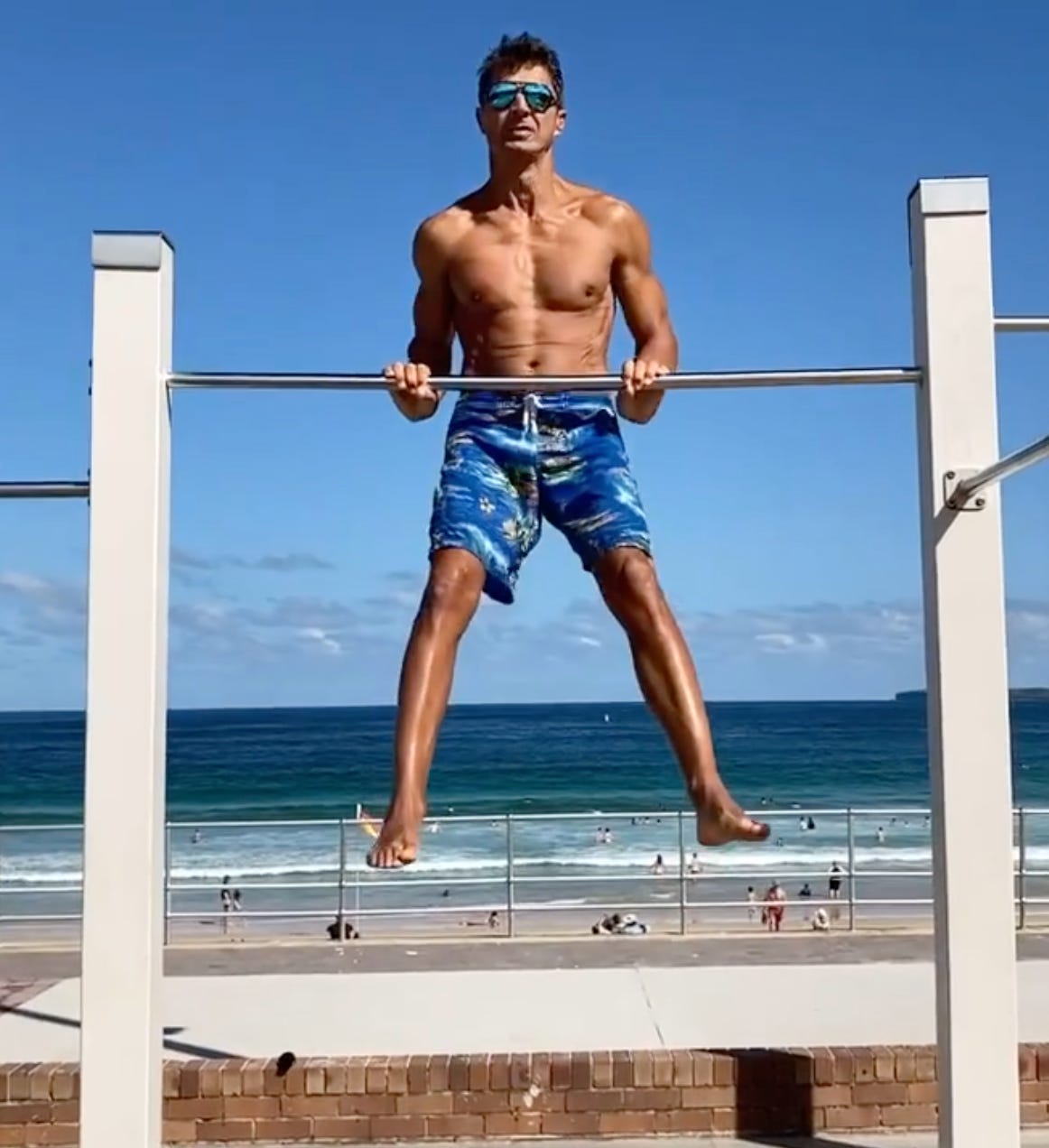

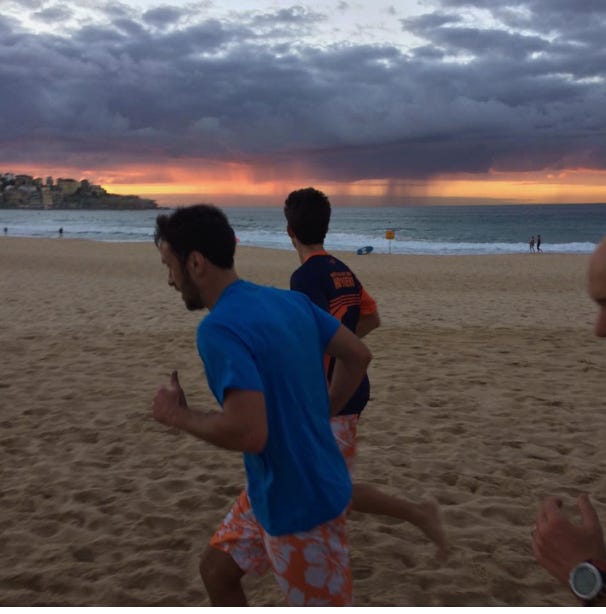

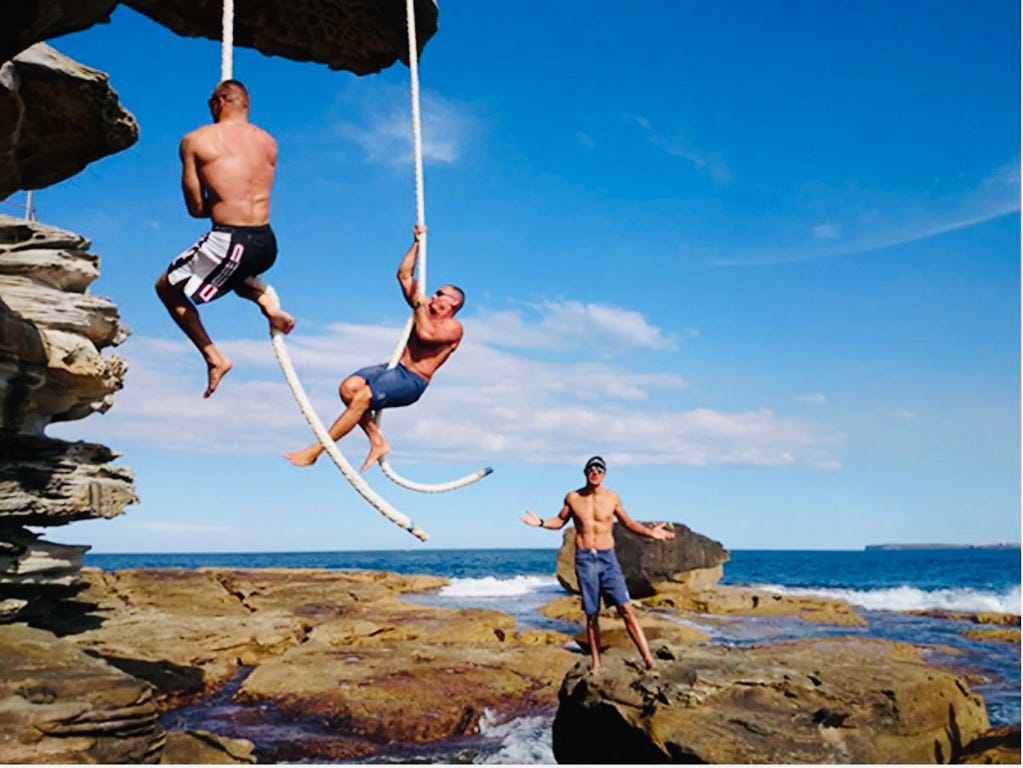
What a story! can never take time for granted. I’m guilty of it.
Thanks for sharing that. It's inspiring to see how people can accomplish so much, even in middle age. It reminds of my "Finding Ultra" by Rich Roll.
My favorite part was how he decided to stick to his commitment to exercising like the beach runners, even after he found out that everything was alright: “You have to keep your promise to yourself about what you would have done if you could just have that second chance.”
I wonder how many of us would actually keep that promise once the impending fear of death was removed.